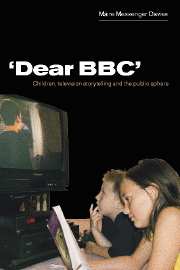Book contents
- Frontmatter
- Contents
- List of tables
- Acknowledgements
- Introduction
- Part I Broadcasting institutions and childhood
- 1 Children and broadcasting in the 1990s
- 2 The importance of television storytelling
- 3 Changing childhood
- 4 ‘Dear BBC’: Children's relationship with broadcasters – the consumer child
- Part II The social functions of broadcasting
- Part III The art of television
- Conclusion: children and television drama – narrative closure?
- Appendix 1
- Appendix 2
- References
- Index
2 - The importance of television storytelling
Published online by Cambridge University Press: 12 October 2009
- Frontmatter
- Contents
- List of tables
- Acknowledgements
- Introduction
- Part I Broadcasting institutions and childhood
- 1 Children and broadcasting in the 1990s
- 2 The importance of television storytelling
- 3 Changing childhood
- 4 ‘Dear BBC’: Children's relationship with broadcasters – the consumer child
- Part II The social functions of broadcasting
- Part III The art of television
- Conclusion: children and television drama – narrative closure?
- Appendix 1
- Appendix 2
- References
- Index
Summary
Once you get into it you are just, like, hooked.
Boy, 10, rural primary schoolBroadcast drama is an art-form in its own right – the most important of all the new forms made possible by radio and television.
People and Programmes: BBC Radio and Television for an Age of Choice, BBC, 1995, p.54In British television, drama is a ‘flagship’ genre both in the main schedules, and in schedules for children, and its survival as a staple ingredient of children's schedules has been seen as a mark of quality by Blumler (1992) and Davies and Corbett (1997), as well as a central ingredient in a public service system like the BBC (Home, 1993; BBC, 1995). According to People and Programmes (BBC, 1995, p. 54) British television drama is ‘the most influential and, at its best, the most original source of dramatic fiction. It has its own forms – the soap, the series, the serial.’ These forms have been inherited from earlier media – the soap from radio, the series and the serial from literary fiction. Television drama also includes the single play (not included in the list above) with its antecedents in live theatre.
In its early days, in the 1950s and 1960s, the single television play was produced live in a studio, and its outstanding practitioners were writers such as Paddy Chayefsky in the USA, and Dennis Potter in the UK – who claimed in his McTaggart Memorial Lecture in 1993 that the medium of television was the true ‘national theatre’. Nowadays, single TV plays have more in common with the other major twentieth-century dramatic art-form, the full-length feature film, and both the BBC and Channel 4 have become partners in film production.
- Type
- Chapter
- Information
- 'Dear BBC'Children, Television Storytelling and the Public Sphere, pp. 49 - 75Publisher: Cambridge University PressPrint publication year: 2001

